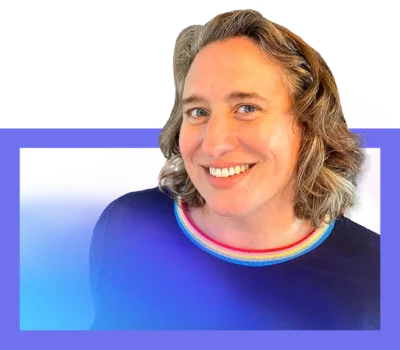Ignoring inner me
All her life, Meredith Arthur is a model of competence and control, and it sweeps her higher and higher up the professional ladder. But inside, something isn’t right. After a painful wake-up call, Meredith drops the version of herself that she’s constructed and starts noticing the one she’s long neglected.


Table of Contents:
Transcript:
Ignoring inner me
MEREDITH ARTHUR: Jobs come and go. My salary gets higher, my title gets more impressive. I lose track of what my actual skill set is, but that’s okay, because I have another skill: I can survive. I know what people out here value. I know what kind of person to be. I can read the room and give people exactly what they want.
ROHAN GUNATILLAKE: You might not know Meredith Skrzypek Arthur personally, but you know someone like her, or maybe you’re like her: accomplished, fun, competent, effortless in the way she succeeds in pretty much everything. But here’s the thing Meredith can’t admit for decades: All that success isn’t effortless at all. In fact, it’s destroying her from within.
In this episode of Meditative Story, Meredith describes what happens when your external and inner selves have very different needs. Things get rough in her life, but that’s how she learns what must happen – and who she must become. I’m very happy for Meredith 2.0. She’s the author of Get Out of My Head: Inspiration for Overthinkers in an Anxious World, and she’s responsible for the website Beautiful Voyager for overthinkers, perfectionists, and people pleasers. Perhaps some of those words resonate in your life.
In this series, we combine immersive first-person stories, breathtaking music, and mindfulness prompts so that we may see our lives reflected back to us in other people’s stories. And that can lead to improvements in our own inner lives.
From WaitWhat, this is Meditative Story. I’m Rohan, and I’ll be your guide.
The body relaxed. The body breathing. Your senses open. Your mind open. Meeting the world.
ARTHUR: Defiance, Ohio, 1983. I’m in first grade on my walk to school. A gentle breeze blows, and I’m humming to myself when something catches my eye from below. There’s a glass factory nearby, and sometimes I find glass parts in the streets. I stop to peer into the gutter. It’s dotted with these strange, heavy slugs of circular glass, white and blue and green. My heart beats with excitement. I am happy.
But there are other feelings, too. Only six years-old, and I am already good at tuning out the voices I don’t want to hear. Especially when they’re coming from inside. Being divided in two helps: Whenever I start to feel uncomfortable, there’s another side of myself to escape into.
I’m Internal Meredith and External Meredith. Internal Meredith always feels slightly detached. She makes up stories in her head and watches her life play out like a TV show. External Meredith is the jokey midwestern girl the world sees. The achiever who likes making people laugh. She’s good at school government. She plays tennis!
She doesn’t tell people about the thoughts that consume her. She doesn’t even articulate them to herself.
I am a worried child. No matter which version of Meredith I’m inhabiting, I am anxious. Especially after fourth grade when we move from Defiance to Toledo. I don’t know what’s wrong with me: my parents are compatible, I have the most expressive father in America, my twin brothers look up to me. But I overthink and try to disappear into knowledge. Thought is the only thing that can swallow up the bad feelings.
I’ve always had headaches, and one day, one of them blossoms into a full migraine. They keep coming. Sometimes they’re so bad I can’t see straight. In junior high, I become more familiar with my bedroom than any preteen ever should be. On the days that I call in sick, I lie stock-still and give myself over to my spiraling thoughts. I ponder the asymmetries of my ‘80s-style purple duvet. I memorize the cracks on the ceiling. They look like tiny rivers.
When my migraines act up, I enter a land of quietness, a place where the world fades away, and a voice is rising up from within. My body is talking to me. “Stop, Meredith,” it’s saying. “Don’t do that anymore.” It’s my body’s way of staging an intervention, but I am not listening. I’d rather just wait for the pain to subside.
GUNATILLAKE: As Meredith says, our bodies can hold a lot of wisdom. How often do you listen to yours? Is there anything it’s saying right now that you could attend to?
ARTHUR: In high school I become obsessed with Shakespeare. In college, I fall hard for Proust. When my younger brothers want me to buy them beer, I make them read a sonnet in exchange.
After college, I take a course in book publishing. The other students and I are divided into mock publishing houses, and mine decides I should be the publisher. I seem strong and determined, I laugh a lot. What do they know? They can’t see the churn inside of me.
A deep sense of unease follows me everywhere. Sometimes it goes quiet long enough that I can fool myself into believing that it’s not there anymore. If I just keep pushing myself, everything will be okay. I make my way into the world of publishing, then move to San Francisco, where I pivot to the start-up world. It moves faster than book publishing. We’re paid to be playful and game for anything. We’re all scaling up!
Jobs come and go. My salary gets higher, my title gets more impressive. I lose track of what my actual skill set is, but that’s okay because I have another skill: I can survive. I know what people out here value. I know what kind of person to be. I can read the room and give people exactly what they want.
One day what the people want is for me to crouch under a table, holding open a plastic bag. I’m working at a food website now, and on this day, I’m producing a photo shoot that involves models eating pork, or rather pretending to. My job is to hover underneath them, catching the food they drop. On breaks, I chat with a guy on set. He tells me later that I seemed like somebody that people listen to. That man becomes my husband.
I’m almost 40. I have a young daughter, and my husband and I have just bought our first home. My career is still going well. I’ve learned to tell other people that I love data. I’ve learned to tell this to myself. People love to hear this. Even when I get let go from a job, I know how to line up another before most people even know I lost my last one.
I’m working at another startup, one that makes emoji keyboards. Our office is in a groovy co-working space in San Francisco’s Tenderloin district. My team is a bunch of young designers, guys who wear the right sneakers and know how to use Instagram before Instagram is a thing. Working with them, I feel insecure. I spend most of my energy trying to stay relevant. I obsess over my Twitter feed, the way I dress. I am spending less time with my family, and I’m quiet and distracted around them. When I try to make sense of all this, it’s a strange task, because what I feel is disconnected from my feelings. I’m a spinning head of thoughts floating above a body in pain. I don’t have the language to describe what is happening. I am beyond words. I just try to stay numb.
My headaches are getting worse. I’m on Topamax, a drug that is generally used to treat seizures but also helps people suffering migraines. Its side effects include weight loss and brain fog. I’m definitely acting different.
It must be the stress of work. The guys I spend my waking hours with have this whole world of knowledge that makes zero sense to me. They’re more than 10 years younger than I am, and they know how to bring out my insecurities, how to send External Meredith into hyperdrive.
One day, I type a question into one of our many Slack channels. I am curious about our product’s relationship to the word “hipster.” “Let’s talk about it,” I say. The response I get is all Kanye GIFs. Little clips of Ye raising his hands toward the heavens. I have no idea what this actually means, but meaning is beside the point. Their message is clear: “Kanye doesn’t ask what it’s going to be. He just knows.” I feel lost.
Here’s what I know: I walk around the house with ice packs wrapped around my head. I’m losing my self-confidence. I’m losing faith in the idea that I even know the first thing about what I am doing. Should I be listening to Kanye?
One fall morning I wake up with the beginning of a migraine. I’m lightheaded, and my fingers are numb. It’s going to be a bad one, I can tell. I lay on the couch thinking: I really, really don’t want to go. Internal Meredith wants me to slow down, stay awhile. External Meredith says: “But you’ve got to go, you’ve got to go.” The two parts of me are dueling. It takes me a long time to get off the couch.
I’m super lightheaded and nauseous when I finally make my way onto the bus. I pull out a little light reading material – an academic study on brain surgery – and force myself to focus on the words. I keep reading, but I have the distinct feeling I’m going to faint. And then I do.
Four blocks later, I come to. My head is conked out against the cold plastic of the bus seat, and I’m looking up at the roof. Concerned passengers have come over. I accept a stranger’s granola bar. It’s only now that I notice what’s happened. I’ve peed myself.
Drenched in urine and horrified, I step off the bus. I wait at the stop for my husband to pick me up. This is the part where I wish I could say everything changes, where I finally see that something is wrong. Instead I decide: I can ride this out.
A few months after the bus incident, I’m working at a car company. Not that I know anything about cars. But car companies need producers who love data, and – haven’t you heard? – I love data.
My head is spinning all the time. I’m fighting with my husband. He thinks maybe the medication is impacting my personality. It’s true. I take it every day, and it makes me zone out, lose words. I stare into space for minutes at a time. I’m scared about what will happen if I go off it. I can’t afford to feel even worse. Maybe we need to increase the dosage.
I go to see my neurologist. I tell her I’ve been reading up on the research, and we talk about the holes in it, all the information the scientists still need. But before I can bring up another article, she tells me to slow down. She says: “I think I know what’s wrong. I’m fairly certain that you have Generalized Anxiety Disorder.”
I take a deep breath. I feel like I have been picked up from the earth, turned around, and set back down. Later, when I go to a psychiatrist at UCSF, a dark-haired man with an air of sophistication, I’m told he shares my neurologist’s view. I have an official diagnosis, and nothing is ever the same again.
GUNATILLAKE: Let’s breathe with Meredith here. Feeling the freedom of that which had not been named, finally being named. Breathing. And with a slight emphasis on the out-breath with its natural qualities of release and softening.
ARTHUR: I’m on the same planet, but everything looks different. Soon I taper off my migraine medication and start taking Lexapro. The change is profound. It’s not just the medication, or the diagnosis. I’ve been given permission to see my life in a whole new light, to finally nurture the part of me that’s been dragged along on this crazy journey. I’ve been killing myself trying to find solutions. It turns out I never knew what the problem was.
My body is no longer a battleground. The English writer Hilary Mantel, whose migraines cause day-long bouts of vomiting and hallucinations, calls her affliction a “secret talent.” I’m not visited by ghosts and visions the way she is, but something else happens, and it’s no less majestic. I suddenly feel all of the pain and turmoil that has been bubbling up within, trying to get my attention. It’s a bit terrifying, knowing that I’ve been ignoring it all for so long. I was so active in looking for solutions. How could I have been so blind to the anxiety within me? Now it’s like I’ve been given the keys to myself. At last, I can open the door, and two incompatible versions of Meredith can see themselves out.
When my brother and his young sons used to come to visit, the chaos they brought with them would drive me wild. I’d stand in the kitchen, my eyes fixed on the toaster, my nephews’ screams ringing off the walls, frustration rising within me. The drama of another family, the needs and noise of children who aren’t my own – it was too much. But I’d muscle through, make dinner for the gang.
Now, though, I am finally able to let go. I call this my Ego Death. My ego – that part of myself that was so concerned with being good enough, cool enough, disruptive enough – melts away. The need to fight against the natural order of things, to prove that I can do any job, no matter how unsuited for it I am. The need to be the kind of woman who uses Kanye gifs. It has melted away. When my brother and his family come to visit and I start to feel that familiar tug of despair, I recognize what is happening. I need space, so I throw on my jacket and take a walk. Nobody minds. Nobody starves.
Something about understanding my wiring makes it harder for me to keep sweating it. Stuff big and small, I let it roll off. My ego still weighs down on me, but I know when to give myself a break. When my body tells me to slow down, I listen. Despite all my experience as an over-thinker, I missed the big idea. My worries about what other people were saying and what they were thinking clouded my vision. The feelings were there for a reason, trying to tell me something. Their conduit was my body flaring up. They were desperately trying to get my attention. ”Meredith,” it was trying to tell me, “you are struggling. You are in excruciating pain because, well, you are in pain.”
I used to go crazy decorating the house for Halloween. Stress over whether my husband and I were having sex often enough. Stay up late baking cupcakes for my daughter’s class parties, parties that I’d go to but where I wasn’t exactly “present.”
My daughter is now 11. She makes fun of me for not being like the other moms, the ones who panic over bedtimes and the foods their kids eat. She does all sorts of routines at my expense. My favorite one might be where she impersonates my little toe. She’s a laugher, like me – happily, inner Meredith enjoys a good yuk as much as external Meredith did.
From the outside, my life doesn’t look all that different than it used to. But I inhabit it entirely differently. I know my bad habits. When I catch myself being numb or absent, I mentally tap myself on the shoulder and slide back into the moment. The moment was always there, waiting for me, and waiting for me to find me.
Rohan’s closing meditation
GUNATILLAKE: There is a lot of natural mindfulness in Meredith’s story. So what I want to do in our closing meditation is build on it, and we’ll start with Doctor Who.
If you’ve watched a fair bit of Doctor Who, you’ll know that there is a bit of a trope, certainly in the modern Doctor Who era, about the power of naming monsters. The way an episode might go is that some monster or other will be causing all sorts of havoc, and the Doctor will turn up and start investigating. And because the Doctor has been doing their thing for millennia, they’ve basically seen it all before. So there is a moment when the Doctor identifies what the monster is and names it to its face. And in that naming the monster loses some of its power, and the episode pivots to the good Doctor’s inevitable victory. A similar thing also happens in a lot of fantasy fiction, be that books or TV, names have power, and by speaking them you take some of that power.
So that’s what we’re going to do. Learn to name our monsters, our inner monsters. And in the doing, learn a way to take away part of their power over us. What that specifically means is that when we have any challenging thoughts or thought patterns causing havoc through our minds, we name them and say hello. Hello doubt. Hello fear. Why hello there sense-of-feeling-worthless. Ace to see you again!
So let’s try that now.
Connecting with the body. Settling into stability. Inviting any tension that might be present into softness. Whatever is here in the mind, let’s name it. For me it’s restlessness, what is it for you?
However mundane, let’s name it.
Hello calm. Hello distraction. Hello confusion.
This technique may be one you’ve heard me outline before. And the reason I love it so much is two-fold. First it’s just pure straight up mindfulness, knowing what is happening in our minds while it happens.
And secondly, because it’s so easy to do, we can train it at any time. And if we get good at being able to name our mindstates, when things really get difficult and the real monsters turn up, we will have built the skills to name them in the heat of the moment. So even though there may not be much around right now, certainly not enough to fill a Doctor Who episode, we practice all the same, so that our skills in the power of naming grow, and it becomes second nature.
Thanks for being here, and thank you Meredith for sharing your story.
Go well.





